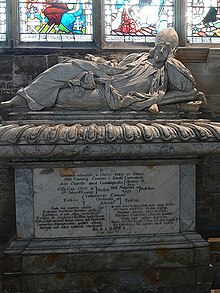Peter Gunning
This article needs additional citations for verification. (October 2008) |
Peter Gunning | |
|---|---|
| Bishop of Ely | |
 | |
| Diocese | Diocese of Ely |
| In office | 1675–1684 |
| Predecessor | Benjamin Lany |
| Successor | Francis Turner |
| Other post(s) | Bishop of Chichester (1670–1675) |
| Orders | |
| Consecration | 6 March 1670 by Gilbert Sheldon |
| Personal details | |
| Born | 1614 |
| Died | 6 July 1684 |
| Buried | Ely Cathedral |
| Nationality | British |
| Denomination | Anglican |
| Education | The King's School, Canterbury |
| Alma mater | Clare College, Cambridge |
Peter Gunning (1614 – 6 July 1684) was an English Royalist church leader, Bishop of Chichester and Bishop of Ely.
Life
[edit]
He was born at Hoo St Werburgh, in Kent, and educated at The King's School, Canterbury and Clare College, Cambridge, where he became a fellow in 1633.[1] Having taken orders, he advocated the Royalist cause eloquently from the pulpit. In 1644, during the English Civil War, he retired to Oxford, and held a chaplaincy at New College until the city surrendered to the Parliamentary forces in 1646. Subsequently he was chaplain, first to the royalist Sir Robert Shirley of Eatington (1629–1656), and then at the Exeter House chapel. After the Restoration in 1660 he was installed as a canon of Canterbury Cathedral. In the same year he returned to Cambridge as Master of Corpus Christi, and was appointed Lady Margaret's Professor of Divinity. He also received the livings of Cottesmore, Rutland, and Stoke Bruerne, Northamptonshire.
In 1661 he became head of St John's College, Cambridge, and was elected Regius Professor of Divinity. While he served as Regius Professor of Divinity he established an Arminian soteriological tradition at Cambridge that was furthered by his successor Joseph Beaumont.[2] He was consecrated bishop of Chichester in 1669, and was translated to the see of Ely in 1674–1675. Holding moderate religious views, he disliked equally Puritanism and Roman Catholicism.
Works
[edit]His works are chiefly reports of his disputations, such as that which appears in the Scisme Unmask't (Paris, 1658), in which the definition of a schism is discussed with two Roman Catholic opponents John Spenser and John Lenthall.[3]
Family
[edit]A relative of his, Sir Robert Gunning, became a famous diplomat.
References
[edit]Citations
[edit]- ^ "Gunning, Peter (GNN629P)". A Cambridge Alumni Database. University of Cambridge.
- ^ Tapsell 2012, pp. 48–49.
- ^ Pollen 1912.
Sources
[edit]- This article incorporates text from a publication now in the public domain: Chisholm, Hugh, ed. (1911). "Gunning, Peter". Encyclopædia Britannica. Vol. 12 (11th ed.). Cambridge University Press. pp. 722–723.
- Hutchinson, John (1892). . Men of Kent and Kentishmen (Subscription ed.). Canterbury: Cross & Jackman. pp. 58–59.
- Pollen, John Hungerford (1912). . In Herbermann, Charles (ed.). Catholic Encyclopedia. Vol. 14. New York: Robert Appleton Company.
- Tapsell, Grant, ed. (2012). The later Stuart Church, 1660–1714 (1 ed.). Manchester: Manchester University Press. pp. 48–9. doi:10.2307/j.ctt1vwmdzv. ISBN 978-1-5261-3072-3. JSTOR j.ctt1vwmdzv.
- 1614 births
- 1684 deaths
- 17th-century Church of England bishops
- Regius Professors of Divinity (University of Cambridge)
- Alumni of Clare College, Cambridge
- Arminian ministers
- Arminian theologians
- Bishops of Chichester
- Bishops of Ely
- English male non-fiction writers
- English theologians
- Lady Margaret's Professors of Divinity
- Masters of Corpus Christi College, Cambridge
- Masters of St John's College, Cambridge
- Participants in the Savoy Conference
- People educated at The King's School, Canterbury
- People from Hoo St Werburgh
- 17th-century Anglican theologians
